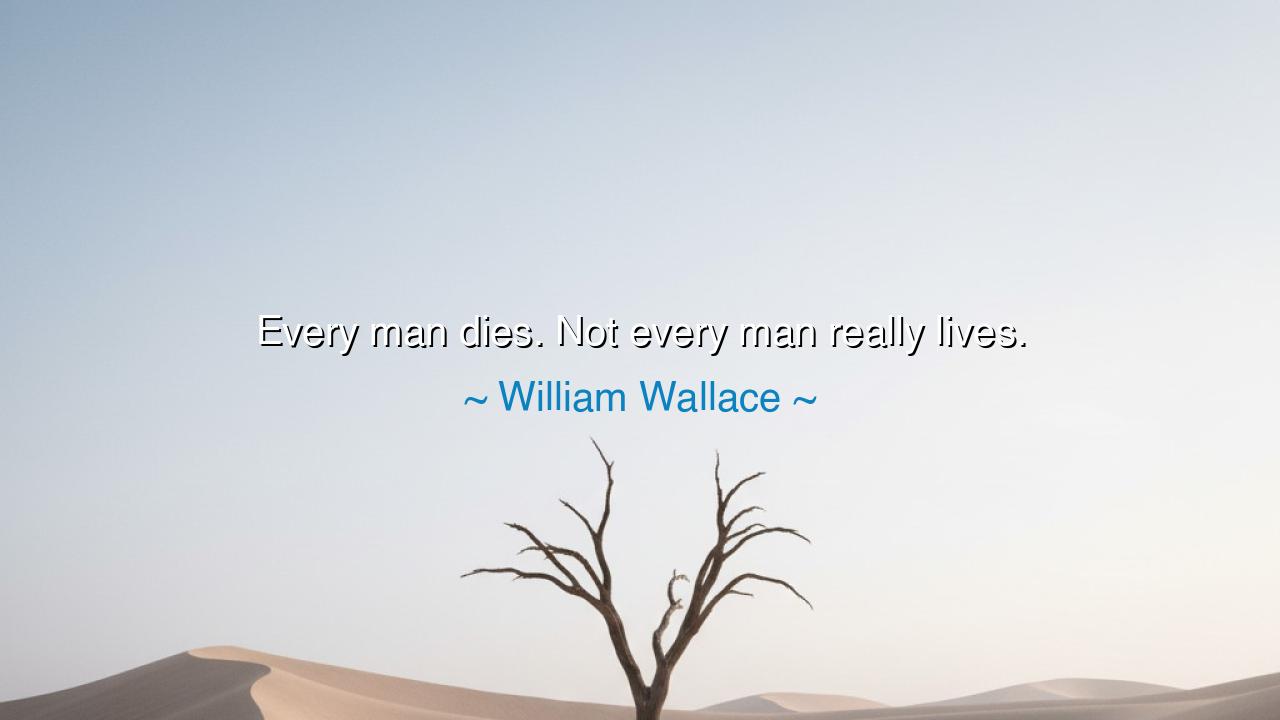
Every man dies. Not every man really lives.






“Every man dies. Not every man really lives.” — these immortal words, often attributed to William Wallace, rise from the mists of history like the cry of a warrior whose spirit refused to bow before tyranny. Whether spoken on a battlefield or imagined through legend, they burn with a truth that transcends time: that existence is not the same as living, and that many walk through their years as shadows — breathing, but not alive; enduring, but not free. Wallace, the Scottish hero who fought against English oppression, reminds us that the measure of life is not in its length, but in its depth, courage, and purpose.
The origin of this quote lies in the story of Wallace himself — a man who rose from humble birth to lead his people in their struggle for freedom during the 13th century. Though he knew that rebellion meant certain death, he chose it willingly, believing that a life lived in chains was no life at all. In the chronicles of his defiance, we see the seed of his words: all men share the fate of death, but few possess the bravery to truly live — to stand for something greater than themselves, to walk the hard road of honor when the easy path of safety beckons. This idea, later immortalized in tales and films, is the eternal anthem of the human spirit against fear.
To really live, as Wallace implies, is not merely to survive the passage of days, but to fill those days with meaning. Many exist in comfort but without purpose, trapped in the dull routine of safety, never daring to love deeply, to risk greatly, or to fight for what they believe. Wallace’s words thunder against such complacency, calling each soul to awaken — to throw off the shackles of apathy and embrace the fire of passion, conviction, and truth. Death is inevitable; but a life unlived, a heart that never burns with purpose, is a death endured daily in silence.
History has given us many who embodied this creed. Joan of Arc, a young woman from a small village in France, heard the call of her faith and rose to lead armies against impossible odds. She knew her defiance would bring her to the stake, yet she did not falter. For her, like Wallace, the choice was clear: to live a short life in truth was better than a long one in fear. When the flames rose around her, her body perished — but her spirit lived on, more eternal than the empires that condemned her. Thus do Wallace’s words ring true: every man dies, but not every man truly lives, for the living are those whose courage outlasts their flesh.
Yet not all great living is found in battle or sacrifice. There are quiet heroes too — those who live fully through kindness, creation, and love. Vincent van Gogh, poor and scorned in his time, poured his soul into colors that the world would not understand until long after his death. His days were lonely and filled with struggle, yet each brushstroke was a prayer to life itself. Though he died young, his art became a hymn of eternal vitality — proof that to live deeply is to give oneself completely to one’s calling, regardless of the reward. In him, as in Wallace, life triumphed over mortality.
Wallace’s words are not merely a call to heroism; they are a mirror for every soul. They ask: Are you truly living, or merely existing? Do you wake each day with a sense of purpose, or drift through time waiting for the end? Life is not meant to be preserved like a treasure, but spent like an offering. To live is to risk, to create, to forgive, to fight for love and justice even when the world mocks or resists. The man who fears death dies many times before his end; the one who embraces life fears nothing, not even the grave.
So, my friend, take heed of this ancient wisdom: do not wait for death to remind you of what it means to live. The moment you choose to act from courage, to follow your heart in defiance of fear, you begin to live truly. Speak your truth though your voice tremble; stand for what is right even if you stand alone. Seek joy in the struggle, meaning in the hardship, and freedom in the giving of yourself. For one day, as Wallace said, you too shall die — but let it never be said that you did not live.
In the end, to really live is to become immortal in spirit. The body fades, the name is forgotten, but the soul that dared to live fully — to love without restraint, to serve without fear, to fight without hate — endures forever. And when the final hour comes, you will not meet death as a stranger, but as an old friend, knowing that you have already conquered him — not by avoiding your fate, but by embracing your life.






AAdministratorAdministrator
Welcome, honored guests. Please leave a comment, we will respond soon